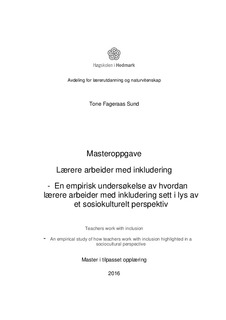| dc.contributor.author | Sund, Tone Fageraas | |
| dc.date.accessioned | 2016-08-04T09:13:13Z | |
| dc.date.available | 2016-08-04T09:13:13Z | |
| dc.date.issued | 2016 | |
| dc.identifier.uri | http://hdl.handle.net/11250/2397841 | |
| dc.description | Mastergradsoppgave i tilpasset opplæring, Avdeling for lærerutdanning og naturvitenskap, Høgskolen i Hedmark, 2016. | nb_NO |
| dc.description.abstract | Norsk:
Dette er en masteroppgave i tilpasset opplæring ved Høgskolen i Hedmark. Gjennom forskningsarbeidet har jeg ønsket å finne ut hva lærerne selv vektlegger i sitt arbeid med inkludering, og se hvordan en sosiokulturell tilnærming, med fokus på samarbeid og elevenes ressurser kan bidra i inkluderingsarbeidet. Jeg vil også belyse hva slags innvirkning samarbeid mellom lærere, og utnyttelse av deres profesjonskunnskap, har på inkluderingsarbeidet. Studien tar utgangspunkt i forståelsen av inkluderingsbegrepet i Salamancaerklæringen (1994). Jeg har valgt meg ut en skole som har inkludering i sin pedagogiske plattform. Det empiriske materialet bygger på 6 semistrukturerte intervjuer av lærere med ulik bakgrunn og kompetanse.
Undersøkelsens teoretiske forankring er Vygotskys sosiokulturelle teori. Vygotsky var selv opptatt av inkludering, og utfordringer rundt dette, og hans sosiokulturelle tilnærming til inkludering innebærer at lærerne så langt som mulig må innlemme alle elever i læringsfellesskapet (Kozulin & Gindis, 2007). Vygotskys sosiokulturelle teori, og hans læringssyn forutsetter samarbeid både mellom lærere, elever og mellom lærer og elev. En sosiokulturell tilnærming til lærernes praksis innebærer at elevenes språklige og kulturelle forutsetninger betraktes som en ressurs. Studien har hatt utgangspunkt i følgende problemstilling: «Hvordan arbeider lærere med inkludering i skolen?»
Resultatene av funn viser at lærerne mente at inkludering handler om hvordan hele skolen i fellesskap tilrettelegger for mangfold. Oppgavens teorigrunnlag og empiriske funn vektlegger sosiokulturelle faktorer som fellesskap og samarbeid når lærernes profesjonskunnskap skal utnyttes på en hensiktsmessig måte. Resultater av funn tyder på at bevisst bruk av samarbeid mellom elevene og ressursfokus bidrar til inkludering. Det samme var tilfelle når lærere reflekterte rundt hva som kunne oppleves som barrierer for læring og deltakelse hos elevene, og hva de måtte gjøre for å forebygge slike barrierer. Funn tyder på at samarbeid er en avgjørende faktor for endring i skolen, og at typen samarbeid innvirker på hvor godt skolen lykkes. En hensiktsmessig tilnærming til arbeidet med inkludering har vekt på lærernes profesjonalitet og myndiggjøring, der lærerne får støtte og oppmuntring til å arbeide for utvikling og forbedring i fellesskap. | nb_NO |
| dc.description.abstract | English:
This is a Masters`degree thesis on adaptive education at Hedmark University College 2016. Through the reseach I wanted to find out what teachers themselves emphasize on in their work with inclusion, and see how a sociocultural approach, with focus on working together and pupil`s resources, can contribute in this work. I also want to highlight what type of impact working together and the utilization of the teachers professional knowledge has in the work with inclusion. The study has it`s starting point in the understanding of the notion of inclusion in the Salamanca declaration (1994). For the empirical study, I have chosen a school that has inclusion in their pedagogic platform. The empirical material is based on 6 semi structured interviews of teachers with different background and competence.
The theoretical framework is based on Vygotskys sociocultural theory. Vygotsky himself was engaged in inclusion, and challenges about it, and his sociocultural approach to inclusion implies that teachers, as far as possible, must incorporate all pupils in to the learning community (Kozulin & Gindis, 2007). Vygotskys sociocultural theory, and his view on learning, assumes cooperation among both teachers, teacher and pupil and pupils. A sociocultural approach to the teachers practice means that the linguistic and cultural assumptions of the pupils are viewed as a resource. The study is based on the following approach to the problem: How do teachers work with inclusion in school?
The results of findings show that teachers believed that, inclusion is all about how the whole school together builds an inclusive society to achieve education for all. The theoretical base and empirical findings emphasize sociocultural factors as a community working together when the professional knowledge are exploited in an advantageous way. The findings indicate that a conscious use of cooperation between pupils, and focus on their resources, contribute to inclusion. That was also the case when teachers reflected about what could feel like barriers of learning and contribution among the pupils, and what they had to do in order to prevent such barriers. Findings indicate that cooperation is a crucial factor in the changing of schools in an inclusive way, and the type of cooperation influences how well the schools succeed. An advantageous approach to the work with inclusion has weight on the professionality and empowerment of the teachers, where the teachers are supported and encouraged to work together for development and improvement. | nb_NO |
| dc.language.iso | nob | nb_NO |
| dc.subject | MITO | nb_NO |
| dc.subject | inkludering | nb_NO |
| dc.subject | skolen | nb_NO |
| dc.subject | lærere | nb_NO |
| dc.title | Lærere arbeider med inkludering - En empirisk undersøkelse av hvordan lærere arbeider med inkludering sett i lys av et sosiokulturelt perspektiv. | nb_NO |
| dc.title.alternative | Teachers work with inclusion - An empirical study of how teachers work with inclusion highlighted in a sociocultural perspective. | nb_NO |
| dc.type | Master thesis | nb_NO |
| dc.subject.nsi | VDP::Social science: 200::Education: 280::Special education: 282 | nb_NO |
| dc.source.pagenumber | 97 | nb_NO |
